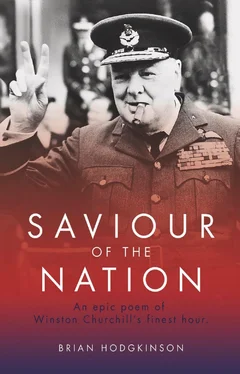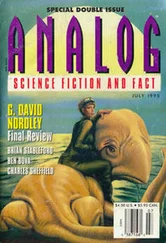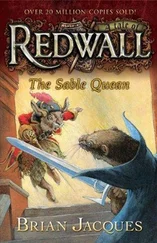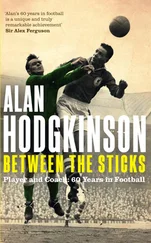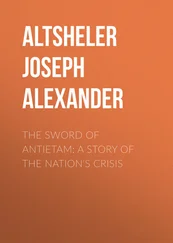Because he’d feared to lose too many votes!
Within the Civil Service some men felt
The need to give support to Churchill’s views,
For they, like him, envisaged Britain’s plight
If she was soon outpaced in armaments.
They secretly informed him of the news
About the German programme, whilst he too
Obtained from agents on the continent
Material to further his critique
Of Baldwin and his government’s policy.
3
Office Denied
Summer 1934
From Germany a fearsome signal came
Of what dire evil gathered there unchecked.
The leader of the Sturmabteilung , Roehm,
Was not content with Hitler’s policies,
Especially for the army, which Roehm saw
As still the Prussian hierarchy’s preserve,
A bastion of social privilege
Denied to those who’d fought for Nazi power
With rallies, marches, violence in the streets.
Stormtroopers, or the Wehrmacht ? Which would hold
The sword of execution in the State?
Though Hitler was reluctant to condemn
A comrade from the Munich barricades,
He did not dare offend the army’s pride.
Upon the Wehrmacht all his hopes were built
Of future war, of German dominance.
With its connivance, Roehm was soon destroyed –
S.S. gunmen shot him down unarmed –
With others who might threaten the regime.
To justify the murders, Hitler claimed
That fateful hour had made him arbiter,
Responsible for German destiny
And thus empowered to disregard the law.
When Churchill heard of this dark episode,
It but confirmed his view of Nazidom.
Yet British leaders still retained some trust
That Hitler’s word could be relied upon.
They signed a naval treaty, which defined
A limit to the German Kriegsmarine .
Henceforth it could not build beyond a third
Of British strength, except in submarines.
Churchill condemned it. Did it not ignore
The limitations still applicable?
Moreover, Churchill knew that not for years
Could Germany construct beyond this norm.
How could the British claim still to respect
Collective action ’gainst the German threat,
When now they came to terms bilateral?
The world could see’, he said, ‘they had connived
At Germany’s undue rearmament.’
The hope of peace was struck another blow
By Mussolini’s greed in Africa.
To claim revenge for Adowa’s defeat
And build an Italian empire in the south,
The Fascist leader wilfully attacked
The ancient State of Ethiopia.
It was not long since Churchill had approved
Of Mussolini as a lawgiver;
But now the Duce clearly had transgressed
The common rules of international law.
A hard dilemma faced the Western powers.
Though Italy had previously opposed
All Nazi plans to coerce Austria,
If France and Britain did not acquiesce
In Italy’s unwarranted attack,
The Fascist State might turn to Germany.
Churchill realised this, yet he advised
That international law was paramount.
The British followed League of Nations’ plans
For economic sanctions, but these proved
Much weakened by omission of the oil
That drove the wheels of Mussolini’s force.
Yet Churchill knew that greater danger lay
In what was happening inside Germany.
For Adolf Hitler, now the Head of State,
Whom every German soldier swore to serve –
Since Hindenburg had died – against advice
Of cautious generals, sent a Wehrmacht force
Across the Rhine to occupy the zone
Devoid of troops since Germany’s defeat.
This was a flagrant challenge to those powers
Who’d signed two treaties with the Weimar State
That guaranteed the western status quo .
It was a gamble. Hitler knew his troops
Could not withstand a major French assault.
But he discerned infirmity of will,
And deep divisions, doubt, and dread of war,
Besetting now the populace of France.
No leader, like the tiger Clemenceau,
Would bend the springs of French resilience.
To Britain Monsieur Flandin looked for help,
Yet Baldwin would do nothing but protest.
The Germans, it was said, had only moved
Into their own back-garden. Hitler drew
Some sure conclusions from his enterprise:
The Western allies would not make a stand;
Their leaders were both timid and corrupt,
Their people feeble, crippled by the fear
Of Armageddon. Whilst in Germany,
They cheered the Austrian corporal’s bold success.
Meanwhile, Churchill was contemptuous
Of Baldwin’s prevarication and delay:
‘They cannot make their minds up. They go on,
Decided in indecision, and resolved
On being always most irresolute.
They’re firm for drift, and impotent in power!’
At this key juncture some had pressed the right
Of Churchill to return to government,
And he himself still coveted the chance
Of moving in the corridors of power.
How much he yearned for office once again:
To speak his mind with due authority,
No longer but to cajole and persuade
These purblind men, who ruled in ignorance.
But Baldwin’s weakness would not let him turn
To one who stood for firmness. He foresaw
Fierce arguments within the Cabinet room,
Across the table Winston’s angry face,
The pointed finger, blunt acerbic phrase,
The facts divulged by sympathetic friends,
The unrelenting will, the wish to act.
Only a few M.P.s and journalists
Supported Churchill’s claim. So once again,
The aging statesman laid ambition down,
And sought for solace at his Chartwell home –
Upon a tree-crowned hill in northern Kent –
Where he took up his pen, and set his mind
On follies of more distant history.
He nursed his grievance, England’s tragedy.
But, in the country, pressure groups were formed,
Who saw the need for forthright leadership.
Though journalism earned him high rewards,
Expensive social life and personal tastes
Incurred large bills, besides the heavy cost
Of life at Chartwell, where the house employed
A range of servants, from a governess
To bailiff, groom and several gardeners.
Clementine, his wife, was always loyal.
His marriage was secure; but troubles came
From wayward children. Headstrong Randolph,
Brave, indeed, but rash, was entertaining hopes
Of having a political career,
Against his father’s contrary advice.
‘An animal love connects us’ Churchill said,
‘But, when we meet, we have a bloody row’.
One daughter recently had been divorced.
Another, Sarah, was about to wed
An entertainer Churchill did not like,
Not least because he was a Viennese,
Twice married and much older than his bride.
Mary, the youngest child, was still at school.
And so, despite some disappointed hopes,
Churchill loved his children, and declined
To let their faults distract him from his task.
And later, in the war, they all would play
An active part, of which he would be proud.
In Parliament he was still moved to speak:
‘Now, like the Great War’s line of Hindenburg,
Across the western front a fortress wall
Would soon be built of bunkers, mines and guns.
Then German arms could turn upon the Slavs.’
He made a sweeping gesture with his hands,
As though he saw the Germans surging through
The undefended borders to the east.
‘No more could Poland, nor the French entente
Читать дальше
